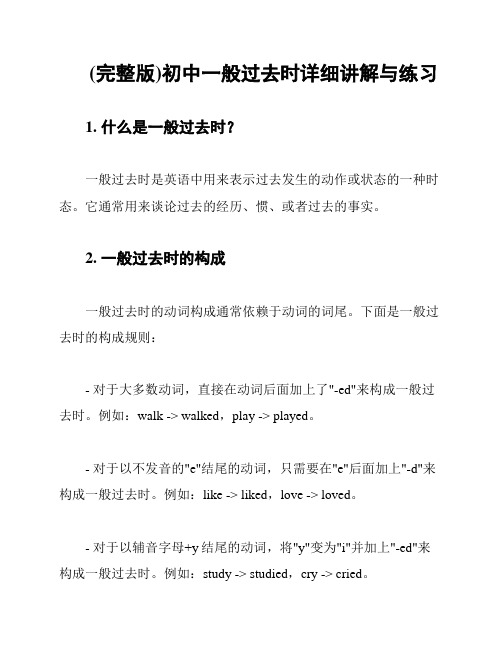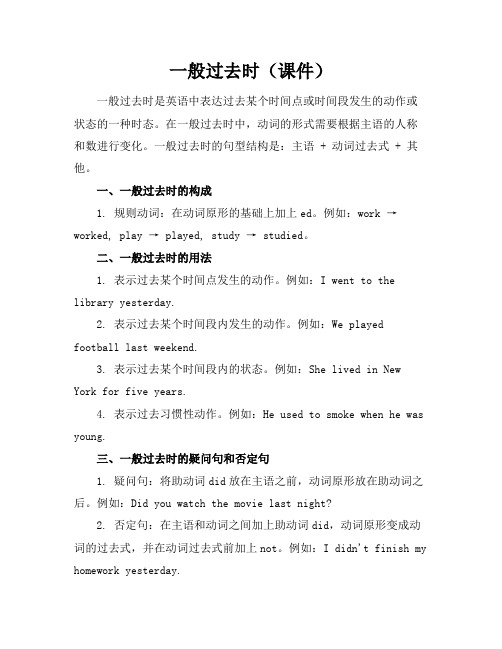初中英语七年级一般过去时讲解
- 格式:docx
- 大小:36.30 KB
- 文档页数:6


(完整版)初中一般过去时详细讲解与练习1. 什么是一般过去时?一般过去时是英语中用来表示过去发生的动作或状态的一种时态。
它通常用来谈论过去的经历、惯、或者过去的事实。
2. 一般过去时的构成一般过去时的动词构成通常依赖于动词的词尾。
下面是一般过去时的构成规则:- 对于大多数动词,直接在动词后面加上了"-ed"来构成一般过去时。
例如:walk -> walked,play -> played。
- 对于以不发音的"e"结尾的动词,只需要在"e"后面加上"-d"来构成一般过去时。
例如:like -> liked,love -> loved。
- 对于以辅音字母+y结尾的动词,将"y"变为"i"并加上"-ed"来构成一般过去时。
例如:study -> studied,cry -> cried。
- 部分动词的一般过去时需要进行不规则变化。
例如:go -> went,eat -> ate。
3. 一般过去时的用法一般过去时通常用来描述以下情况:- 过去发生的动作:I walked to school yesterday.- 过去的经历:He lived in London for five years.- 过去的事实:She was a teacher in the past.4. 一般过去时的句型练下面是一些练,帮助加深对一般过去时的理解和运用:1. 请用一般过去时填空:Yesterday, I ________ (watch) a movie at home.2. 完成句子:He _____ (visit) his grandparents last summer.3. 改写句子,使用一般过去时:I read a book yesterday. (改为否定句)4. 改写句子,使用一般过去时:They played basketball in the park. (改为疑问句)5. 总结一般过去时是用来表示过去发生的动作或状态的一种时态。

七年级上一般过去时知识点在英语学习中,过去时的掌握是非常重要的一步,因为它是英语句子中的重要时态之一。
而在七年级上,我们需要掌握的是一般过去时。
下面将为大家讲解七年级上一般过去时的全部知识点。
一、什么是一般过去时一般过去时,是指发生在过去某个时间里的动作,或是过去某段时间内的重复动作。
在一般过去时中,过去形式一般都为动词的过去式。
二、一般过去时的构造在构造一般过去时时,需要根据不同的动词变化规则进行变化:1.规则动词的一般过去式构成:动词 + ed如:walk → walked;play → played; live → lived;2.以e结尾的动词一般过去时构成:动词 + d如:love → loved; like → liked; live → lived;3.以辅音字母+y结尾的动词一般过去时构成:去掉y,加ied如:study → studied; carry → carried; hurry → hurried;4.不规则动词的一般过去式如:go → went; see → saw; eat → ate; drink → drank三、一般过去时的用法及时间标志1.表示过去某个时间发生的动作Time flies. 时间飞逝。
Yesterday, I visited a museum. 昨天,我参观了一个博物馆。
2.表示过去某段时间连续发生的动作When I was a child, I loved eating candy. 当我还是个孩子的时候,我喜欢吃糖果。
3.表示过去某个时间正在进行的动作At that time, she was reading a book. 那时,她正在看一本书。
时间标志词:yesterday, last week/month/year, in 1990, when, at that time, etc.四、一般过去时的否定句和疑问句1.否定句构成:主语 + did not + 动词原形如:I did not go to school yesterday.2. 疑问句构成:Did + 主语 + 动词原形?如:Did you go to school yesterday?五、一般过去时和现在完成时的区别一般过去时和现在完成时很容易混淆,在使用时需要注意:1.一般过去时表示过去某个具体的时间或一段时间,而现在完成时则表示到现在为止的一段时间内发生的动作或事情。

初中英语语法一般过去时专项讲解及练习一般过去时是英语中常用的时态之一,用来表示发生在过去某个具体时间的动作或状态。
以下是一般过去时的用法及一些练题。
一般过去时的用法1. 表示过去某个具体时间发生的动作或状态。
- I played football yesterday.(我昨天踢了足球。
)- She was a teacher two years ago.(两年前她是一名老师。
)2. 表示过去经常性、惯性的动作或状态。
- We always went swimming in the summer.(我们夏天经常去游泳。
)- He used to live in the countryside.(他过去住在乡下。
)3. 表示过去的客观事实或真理。
- The sun rose in the east.(太阳从东方升起。
)- She knew the answer.(她知道答案。
)一般过去时练题请根据句子的意思,在括号中填上适当的动词的过去式。
1. My friend __________ (visit) me last week.(我朋友上个星期来看我。
)2. They __________ (watch) a movie yesterday evening.(他们昨晚看了一部电影。
)3. Helen and I __________ (play) tennis together when we were children.(海伦和我小时候一起打网球。
)4. He __________ (not go) to school yesterday because he was sick.(他昨天因为生病没去上学。
)5. We __________ (live) in that house for five years before we moved.(我们在那个房子住了五年才搬走。
)总结一般过去时用于表示过去某个具体时间发生的动作或状态,过去的经常性、习惯性动作或状态,以及客观事实或真理。

语法精讲一般过去时(Ⅰ)1、一般过去时的基本定义一般过去时表示在过去某一时间发生的动作或存在的状态,也可以表示在过去某一阶段经常或反复发生的动作。
2、与一般过去时连用的时间状语yesterday(昨天),last week/month/year(上周/上个月/去年),two days/months ago(两天/两个月前),the day before yesterday(前天),in 2000(在2000年),in those days(在那些日子里),just now(刚才),a moment ago(刚才)等常与一般过去时连用。
3、一般过去时的句式结构(1)、含be动词的过去时的句式①肯定句:主语+was/were+其他.如:I was late for school yesterday morning.昨天早上我上学迟到了。
②否定句:主语+was/were+not+其他.如:The school trip wasn't interesting last week.上周的学校旅行不是很有趣。
③一般疑问句:Was/Were+主语+其他?肯定回答:Yes,主语+was/were.否定回答:No,主语+wasn't/weren't.如:—Were you late yesterday?你昨天迟到了吗?—Yes,I was./No,I wasn't.是的,我迟到了。
/不,我没有迟到。
(2)含实义动词的过去时的句式①肯定句:主语+动词过去式+其他.如:They had a good time yesterday.他们昨天玩得很开心。
②否定句:主语+did not(didn't)+动词原形+其他.如:They didn't watch TV last night.昨天晚上他们没有看电视。
③一般疑问句:Did+主语+动词原形+其他?肯定回答:Yes,主语+did.否定回答:No,主语+didn't.如:—Did you go to the park yesterday?昨天你去公园了吗?—Yes,I did./No,I didn't.是的,我去了,/不,我没去。

一般过去时(课件)一般过去时是英语中表达过去某个时间点或时间段发生的动作或状态的一种时态。
在一般过去时中,动词的形式需要根据主语的人称和数进行变化。
一般过去时的句型结构是:主语 + 动词过去式 + 其他。
一、一般过去时的构成1. 规则动词:在动词原形的基础上加上ed。
例如:work → worked, play → played, study → studied。
二、一般过去时的用法1. 表示过去某个时间点发生的动作。
例如:I went to the library yesterday.2. 表示过去某个时间段内发生的动作。
例如:We playedfootball last weekend.3. 表示过去某个时间段内的状态。
例如:She lived in New York for five years.4. 表示过去习惯性动作。
例如:He used to smoke when he was young.三、一般过去时的疑问句和否定句1. 疑问句:将助动词did放在主语之前,动词原形放在助动词之后。
例如:Did you watch the movie last night?2. 否定句:在主语和动词之间加上助动词did,动词原形变成动词的过去式,并在动词过去式前加上not。
例如:I didn't finish my homework yesterday.四、一般过去时的特殊用法1. 过去进行时:表示过去某个时间点正在进行的动作。
例如:What were you doing at 8 o'clock last night?2. 过去完成时:表示在过去某个时间点之前已经完成的动作。
例如:I had finished my work before he came.3. 过去完成进行时:表示在过去某个时间点之前一直在进行的动作。
例如:She had been waiting for two hours when he finally arrived.一般过去时(课件)一般过去时是英语中表达过去某个时间点或时间段发生的动作或状态的一种时态。
知识点总结一般过去时表示过去某个时间里发生的动作或状态;过去习惯性、经常性的动作、行为;过去主语所具备的能力和性格。
我们可以先记一下一般过去时口诀:一般过去时并不难,表示过去动作、状态记心间。
动词要用过去式,时间状语句末站。
否定句很简单,didn't 站在动词原形前,其它部分不要变。
一般疑问句也好变,did放在句子前,主语、动原、其它部分依次站。
特殊疑问句也简单,疑问词加一般疑问句记心间。
最后一条请注意,动词过去式要牢记。
一、基本结构1. 肯定句形式:主语+动词过去式+其他否定句形式:①was/were+not; ②在行为动词前加didn't,同时还原行为动词一般疑问句:①was/were提到句首;②Did+主语+do+其他?例句She often came to help us in those days. I didn't know you were so busy.2. 行为动词的一般过去式。
A. 规则动词的变化规则:1、直接加ed:work—— worked look——looked play——played,2、.以e结尾的单词,直接加d:live ——lived hope——hoped use——used,3、以辅音字母+y结尾的,变y为i加ed:study—— studied carry——carried4、以元音字母+y结尾的,直接加ed:enjoy ——enjoyed5、以重读闭音节结尾的,双写最后的辅音字母+ed:stop—— stoppedplan——plannedB. 规则动词过去式的发音:在清辅音后读/t/,在元音和浊辅音后读/d/,在辅音/t/,/d/后读/id/。
C. 不规则动词变化需参看不规则动词表逐一熟记。
(一般和过去分词一起记忆)。
二、一般过去时的基本用法:1. 通常表示过去发生的而现在已经结束的事件、动作或情况。
Eg. Sam phoned a moment ago.I got up at eight this morning.2. 还可以表示刚刚发生的事情而没说明时间。
七年级一般过去时知识点一、一般过去时的定义一般过去时表示在过去发生的动作或存在的状态。
在英语中,动词的过去式通常是通过在动词后加“-ed”形成的(有些动词则会有不规则的过去式形式)。
例如,walk的过去式是walked,但是,go的过去式是went。
二、动词的过去式大部分动词的过去式都可以在动词后面加上“-ed”,如:play → playedclean → cleanedhope → hoped有一些动词是不规则的,如:go → wenthave → hadeat → ate需要记忆这些不规则形式。
三、一般过去时的肯定句、否定句、疑问句1. 肯定句构成:主语 + 动词过去式 + 其他例如:I played football yesterday.She cleaned the house last night.2. 否定句构成:主语 + did not + 原形动词 + 其他例如:I did not play football yesterday.She did not clean the house last night. 3. 疑问句构成:Did + 主语 + 原形动词 + 其他?例如:Did you play football yesterday?Did she clean the house last night?四、一般过去时的时间状语在一般过去时中,时间状语可以用来说明动作发生的具体时间。
以下是一些常用的时间状语:yesterday → 昨天last night → 昨晚last week → 上个星期last year → 去年例句:I ate breakfast yesterday.We watched a movie last night.She visited her grandparents last week.五、一般过去时的用法1. 表示过去的某个时间发生的动作。
例如:We arrived at the station at six o'clock.He went to the gym every day last week.2. 表示过去的一段时间内反复发生的动作(过去的习惯)。
初中英语知识点总结一般过去时一、一般过去时的用法:一般过去时表示过去发生或完成的动作、存在的状态或做过的事情。
1.表示过去一些时间发生的动作或存在的状态:- I played soccer yesterday.(我昨天踢足球。
)- He lived in Beijing when he was young.(他年轻时住在北京。
)2.表示过去的习惯性动作或经常发生的动作:- When I was a child, I always went to bed early.(我小的时候总是早睡。
)3.表示过去的客观事实或真理:- The dinosaurs died out millions of years ago.(恐龙在几百万年前灭绝了。
)- She didn't know the answer to the question.(她不知道问题的答案。
)4.表示过去的心理活动、愿望或打算等:- I wanted to be a doctor when I was young.(我年轻时想做一名医生。
)- He hoped to go to the park with his friends.(他希望和朋友去公园。
)二、一般过去时的构成:1.肯定句式:主语+动词的过去式+其他成分- I played basketball last week.- She lived in London for three years.- They watched a movie at the cinema yesterday.2.否定句式:主语 + did not / didn't + 动词原形 + 其他成分- I didn't play basketball last week.- She didn't live in London for three years.- They didn't watch a movie at the cinema yesterday.3.疑问句式:Did + 主语 + 动词原形 + 其他成分?- Did you play basketball last week?- Did she live in London for three years?- Did they watch a movie at the cinema yesterday?三、一般过去时的特殊情况:1.动词过去式的构成规则:a) 一般情况下,动词的过去式在词尾加上-ed:walk - walked(走)talk - talked(说话)play - played(玩)b)以字母e结尾的动词,在词尾只加-d:dance - danced(跳舞)c) 以辅音字母+y结尾的动词,将y变为i,再加-ed:study - studied(学习)d) 以重读闭音节结尾,末尾只有一个辅音字母的动词,双写这个辅音字母,再加-ed:stop - stopped(停止)plan - planned(计划)2.部分动词的过去式不规则,需要记忆:be - was / were(是)have - had(有)go - went(去)do - did(做)write - wrote(写)see - saw(看见)eat - ate(吃)drink - drank(喝)take - took(拿)四、表示一般过去时的时间状语:1.表示过去一些时间的状语:yesterday(昨天)last week(上星期)two days ago(两天前)2.表示过去的时间段的状语:when I was young(我年轻时)in my childhood(在我童年时)in the past(在过去)3.表示过去曾经做过的动作的状语:once(一次)五、注意事项:1. 一般过去时的句子中,谓语动词要用过去式,但be动词有时会用was或were。
初一一般过去时讲解一般过去时:一、一般过去时的构成:主语+谓语(动词过去式)+句子其他成分;主语+was/were+形容词/名词/介词短语+过去时间;否定形式①was/were+not;①在行为动词前加didn't,同时还原行为动词;一般疑问句Did+主语+do+其他注意:这里的-ing形式叫做现在分词二、一般过去时句型变化:1、肯定式:主语+谓语(动词过去式)+句子其他成分;主语+was/were+形容词/名词/介词短语+过去时间如:They played computer games together. 他们一起打游戏来着。
I was happy when last week. 上周我很开心。
2、否定式:否定形式①was/were+not;②在行为动词前加didn't,同时还原行为动词;如:They weren't in Paris last year. 他们去年不在巴黎。
I didn’t know that. 我不知道那件事。
3、一般疑问句Did+主语+do+其他。
如:Did you do your homework? 你做作业了吗?4、特殊疑问句式:特殊疑问句结构:特殊疑问词+一般疑问句?现在进行时的特殊疑问句结构:①特殊疑问词+did+主语+do(+其他成分)?②特殊疑问词+was/were+主语+do(+其他成分)?eg:1、What did you do?你们干什么来着?We played basketball.我们打篮球来着。
2、Where were your parents last year?你父母去年在哪里?They were in Tokyo.他们在东京。
注1:1、be动词在现在进行时里算作“助动词”,翻译现在进行时的时候,be不能解释为“是”,否则不通顺。
它只是和现在分词搭配构成“进行时”。
2、变一般疑问句时,形成“一问一答”的关系,要注意第一人称和第二人称相互交换。
3、简略回答时,所有称呼要简化为人称代词:I,we,you,he,she,it,they。
表格整理如下:三、一般过去时的应用1.一般过去时表示在过去某个特定时间发生,也可以表示过去习惯性、经常性的动作。
一般不强调动作的影响,只说明的事情。
句式:主语+动词过去式+宾语+其它I had a word with Julia this morning.今天早晨,我跟朱莉娅说了几句话。
He smoked many cigarettes a day until he gave up. 他没有戒烟的那阵子,抽烟抽得可凶了。
2.一般过去时常与表示过去的时间状语或从句连用,如:yesterday,last week ,in the past ,in 1993,at that time,once,during the war,before,a few days ago,when 等等.①注意在谈到已死去的人的情况时,多用过去时。
He was dead in 1990.3.表示过去连续发生的动作时,要用过去时。
这种情况下,往往没有表示过去的时间状语,而通过上下文来表示。
The boy opened his eyes for a moment,looked at the captain,and then died.那男孩把眼睛张开了一会儿,看看船长,然后就去世了。
4.表示在此之前一段时间内经常或反复的动作。
常与always,never等连用。
Mrs. Peter always carried an umbrella.彼得太太过去老是带着一把伞。
(只是说明她过去的动作,不表明她是否常带着伞。
)例如:Mrs. Peter always carries an umbrella.彼得太太总是带着一把伞。
(说明这是她的习惯,表明她仍然还习惯总带着一把伞)Mrs. Peter is always carrying an umbrella.彼得太太总是带着一把伞。
(表示说话者对这一动作或行为厌烦)I never drank wine.我以前从不喝酒。
(不涉及到说明是否喝酒)6.如果强调已经终止的习惯时要用used to do(过去常常做,而不那样做了)例如:①He used to drink alcohol.他过去喝酒。
(意味着他不喝酒了。
喝酒这个动作终止了)②I used to take a walk in the morning.我过去是在早晨散步。
(意味着不在早晨散步了)③Freddie bought a bicycle three days ago.弗莱迪在三天以前买了一辆自行车。
比较:I took a walk in the morning.我曾经在早晨散过步。
(只是说明过去这一动作)7.有些句子,虽然没有表示过去确定时间的状语,但实际上是指过去发生的动作或存在的状态的话,也要用过去时,这一点,我们中国学生往往出错,要特别注意!例如:①I didn''t know you were in Paris.我不知道你在巴黎。
(因为在说话时,我已经知道你在巴黎了。
这句话指的是说话之前,所以只能用过去时表示。
实际上,这句话暗指:But now I know you are here.)②I thought you were ill.我以为你病了呢。
(这句话应是在说话之前,我以为你病了。
但是我知道现在你没病)四、动词变过去式的规则五、记忆口诀一般过去时并不难,过去动作、状态记心间。
动词要用过去式,时间状语句末站。
否定句很简单,didn't 站在动原前,其它部分不要变。
一般疑问句也好变,did放在句子前,主语、动原、其它部分依次站立。
特殊疑问句也简单,疑问词加一般疑问句记心间。
六、时间状语yesterday (morning,afternoon,evening)the day before yesterdaylast night (week,Sunday,weekend,month,winter,year,century 世纪)agothis morning/afternoon/eveningwhen引导的状语从句(动词过去时)just nowthe other day -- a few days ago.at the age of 10 (过去年龄段)in the old daysat that timeat that moment一般过去时练习:一、写出下列动词的过去分词形式go_______sing_______lie_______study________have_______dance______take_________be_________run________do_________write_______swim______二、用动词的正确时态填空1.I_________(have)an exciting party last weekend.2._________she_________(practice)her guitar yesterday?No,she_________.3.What________Tom________(do)on Saturday evening?He________(watch)TV and__________(read)an interesting book.4.They all___ ______(go)to the mountains yesterday morning.5.She_________(not visit)her aunt last weekend.She________(stay)at home and_________(do)some cleaning.三、按要求改写句子1.The did my homework last night.否定句:____________________________一般疑问句:_________________________肯定回答:__________________________否定回答:__________________________对“did my homework”提问:__________________________2.Lily was in Chongqing last Saturday.否定句:____________________________一般疑问句:_________________________肯定回答:__________________________否定回答:__________________________四、( )1. My father______ill yesterday.A. isn't B. aren't C. wasn't D. weren't ( )2.______your parents at home last week﹖A. Is B. Was C. Are D. Were( )3. The twins______in Dalian last year. They______here now. A. are; were B. were; are C. was; are D. were; was ( )4.______your father at work the day_____yesterday(前天)﹖ A. Was; before B. Is; before C. Was; after D. Is; after ( )5.—Who was on duty last Friday﹖—______.A. I am B. I was C. Yes, I was D. No, I wasn't五、根据中文意思完成句子1. 我过了一个忙碌但却刺激的周末。
I _________ _________ __________ __________ exciting weekend. 2. Jenny喜欢看书。
昨晚她看了一本英语书。
Jenny likes _________ __________. She _________ an English book last night. 3. Emma每天都看电视。
可是昨天他没有看。
Emma__________ TV every day. But he _________ ________ ________ yesterday.4. 上周六他们做什么了?他们做作业和购物了。
What ________ they _________ _________ Saturday?They _________ __________ homework and _________ __________. 5. 今天早上方方得做饭,因为他父亲不在家。